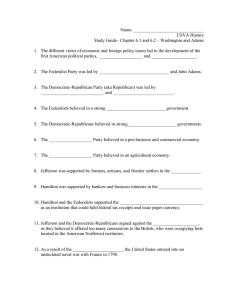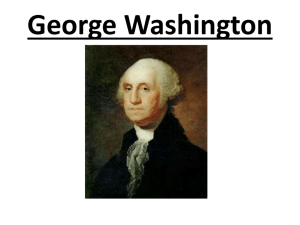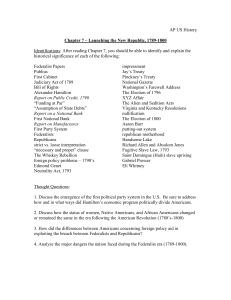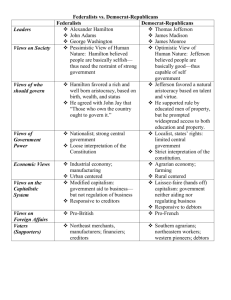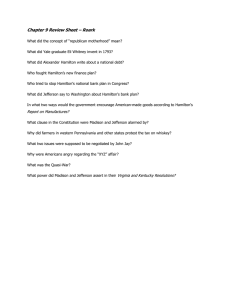AP History – Chapter 7 Vocabulary – Derek Hommel secession
advertisement
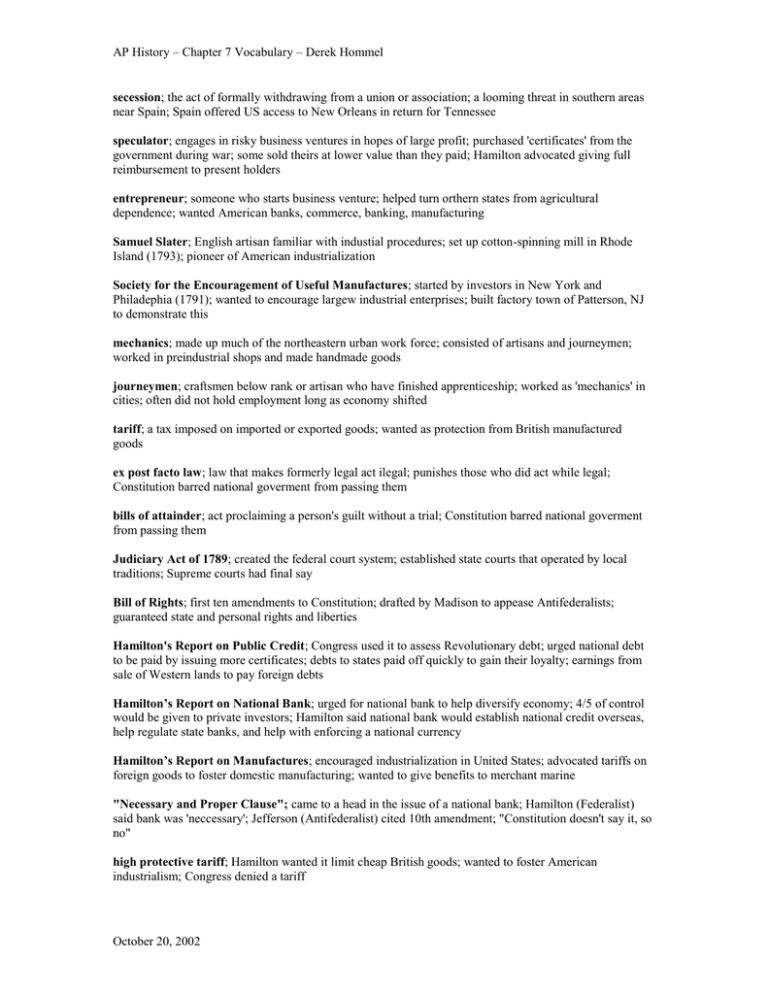
AP History – Chapter 7 Vocabulary – Derek Hommel secession; the act of formally withdrawing from a union or association; a looming threat in southern areas near Spain; Spain offered US access to New Orleans in return for Tennessee speculator; engages in risky business ventures in hopes of large profit; purchased 'certificates' from the government during war; some sold theirs at lower value than they paid; Hamilton advocated giving full reimbursement to present holders entrepreneur; someone who starts business venture; helped turn orthern states from agricultural dependence; wanted American banks, commerce, banking, manufacturing Samuel Slater; English artisan familiar with industial procedures; set up cotton-spinning mill in Rhode Island (1793); pioneer of American industrialization Society for the Encouragement of Useful Manufactures; started by investors in New York and Philadephia (1791); wanted to encourage largew industrial enterprises; built factory town of Patterson, NJ to demonstrate this mechanics; made up much of the northeastern urban work force; consisted of artisans and journeymen; worked in preindustrial shops and made handmade goods journeymen; craftsmen below rank or artisan who have finished apprenticeship; worked as 'mechanics' in cities; often did not hold employment long as economy shifted tariff; a tax imposed on imported or exported goods; wanted as protection from British manufactured goods ex post facto law; law that makes formerly legal act ilegal; punishes those who did act while legal; Constitution barred national goverment from passing them bills of attainder; act proclaiming a person's guilt without a trial; Constitution barred national goverment from passing them Judiciary Act of 1789; created the federal court system; established state courts that operated by local traditions; Supreme courts had final say Bill of Rights; first ten amendments to Constitution; drafted by Madison to appease Antifederalists; guaranteed state and personal rights and liberties Hamilton's Report on Public Credit; Congress used it to assess Revolutionary debt; urged national debt to be paid by issuing more certificates; debts to states paid off quickly to gain their loyalty; earnings from sale of Western lands to pay foreign debts Hamilton’s Report on National Bank; urged for national bank to help diversify economy; 4/5 of control would be given to private investors; Hamilton said national bank would establish national credit overseas, help regulate state banks, and help with enforcing a national currency Hamilton’s Report on Manufactures; encouraged industrialization in United States; advocated tariffs on foreign goods to foster domestic manufacturing; wanted to give benefits to merchant marine "Necessary and Proper Clause"; came to a head in the issue of a national bank; Hamilton (Federalist) said bank was 'neccessary'; Jefferson (Antifederalist) cited 10th amendment; "Constitution doesn't say it, so no" high protective tariff; Hamilton wanted it limit cheap British goods; wanted to foster American industrialism; Congress denied a tariff October 20, 2002 AP History – Chapter 7 Vocabulary – Derek Hommel Whiskey Rebellion; Hamilton passed tax to finance national debt and reduce drinking; farmers were angered; distilled grain was cheapest to ship; violent riots flared and states threatened seccession; Washington led militamen against rioters, who dispersed excise tax; tax on production or consumption of good within a country; Hamilton passed an excise tax on whiskey ; inciting the Whiskey Rebellion St. Domingue (Haiti) slave uprising; British encouraged slaves to revolt in French St. Domingue; Southern states feared that British would do same in America Edmond Genet; French minister to America; ordered to stir pro-France Republicanism; French hoped to mobilize US against Spanish territories; led Clarke and GR Clark against Spanish territories; failed impress; Britain's forcibly enlisting American sailors; Britain's attempt at re-capturing sailors who left for America; revenge for Genet's plundering using American ships privateers; pirates; Americans recruited by Genet to plunder British ships; led to British impressment Anthony Wayne and the Battle of Fallen Timbers; Native Americans ignored Washington's treaties; Wayne led 3000 soldiers and Kentucky militiamen against natives; Wayne defeated one thousand natives ; built a fort to defy British Treaty of Greenville; Wayne forced 12 northeastern tribes to sign treaty; gave America present-day Ohio; ended native aggression for 16 years Jay's Treaty; Britain promised to withdraw troops from America; gave small American ships access to West Indian markets; reduced rights to cargo in Caribbean (sugar, molasses, etc.) Treaty of St. Lorenzo (Pickney's Treaty); between America (via Pickney) and Spain; gave America uninhibited access via Mississippi River; Spain recognized 31st parallel as America's southern boundary; Spain gave up forts in US & stopped inciting native riots abomination; something to be detested, horrifying or disgusting; Federalists viewed French Revolution as abomination; Federalists did not favor "mob rule", guillotine usage, riots demagoguery; appealing to people's prejudices or fears to gain power; Federalists accused this of proFrench Democratic parties partisan; strong support/supporter for a (political) party; ex: Hamilton : Federalist :: Jefferson : Antifederalist cabal; political faction (negative usage); Federalists accused Antifederalists as iligitimate "cabal" ; and vice-versa Republicans; stemmed from Antifederalists; Jefferson chose 'Republican' over radical-sounding 'Democrat'; attacked Federalist "Pro-British" outlook; were accused of wishing to turn America over to France libelous; libel - written statements that deface person or group; slander; both Federalist and Republican newspapers were libelous ; ex: Republicans accused of trying to give US to France; Federalists accused of trying to establish US dynasty October 20, 2002 AP History – Chapter 7 Vocabulary – Derek Hommel apostate; one who abandons their cause, be it religious, political, etc.; Paine ridiculed Washington, asking if he was an apostate Washington's Farewell Address; Commissioned to be written by Madison; rewritten by Hamilton to tie more current political situations is; condemned political parties and demagogues XYZ Affair; France's attempt at bribing America after relations soured ; France promised to sent three unnamed ministers (X, Y, Z); America had to give a loan of $12 million for peace talks to begin; America strengthened navy against French Alien and Sedition Acts: Alien Enemies Act: set guideline for deporting spies and saboteurs from America Alien Friends Act: let the president expel ‘dangerous’ foreigners without evidence Naturalization Act: extended residency requirements for citizenship from 5 to 14 years In hopes to deterring Irish immigrants from swaying votes Sedition Act: only one that could be used against American citizens; person could be jailed For speaking against the government Matthew Lyon; Republican congressman jailed under Sedition Act ; for speaking against Adams Virginia and Kentucky Resolutions; state legislatures had right to judge constitutionality of federal acts; federal laws could be nullified by states; "interposition" and "nulification" interposition and nullification; interposition: being introduced between parts; intervening; nullification: the act of invalidating; used in Virginia and Kentucky Resolutions; explained states' positions concerning federal unconstitutionality High Federalists; Hamilton's Federalists, as opposed to Adams' Election of 1800; tensions between political parties created fear of civil war; Adams made peace with France; Jefferson discouraged radicals; Adams lost by 8 of 138 electoral votes; Jefferson and Burr tied; Jefferson won when one Burr supported switched sides Twelfth amendment; prevented such things as Jefferson-Burr tie; now you voted for President and VicePresident as a pair; before, runner-up was Vice-president Handsome Lake; Seneca leader; led natives to stop drinking and bolstered religious feelings; welcomed Quakers and Western agriculture techniques; opposition was accused of witchcraft Fugitive Slave Law; forced judge to return runaway slave at master's request; runaways were denied trials; could be used against free blacks if accused; brought on by slave revolt in Haiti Gabriel Prosser & Gabriel's Rebellion; Prosser led slave revolt in Richmond, Virginia; 35 slaves executed, including Prosser * note: could not find Stephen Girard! October 20, 2002
